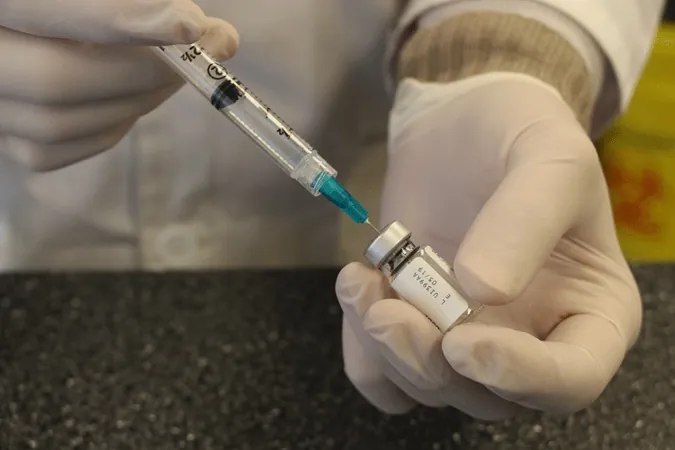
Essential Travel Safety Tips for Albertans This Winter
2024-12-09
Author: Liam
Introduction
As the winter chill sets in, the Alberta Health Services (AHS) is urging all Albertans to prioritize safety during their travels. While escaping to warmer climates is a popular way to combat seasonal blues, it’s imperative to plan ahead to ensure everyone travels healthily.
Your Health is Your Wealth: Before You Go!
Before heading out, it's essential to schedule a visit with your doctor several months in advance. This proactive approach ensures you are up-to-date on necessary vaccinations and allows for the discussion of any required medications based on your travel destination. For instance, travelers with asthma should be cautious when visiting polluted urban areas, and those heading to tropical regions may need malaria prevention pills.
If your dream destination is known for malaria risk, make it a point to see a travel health specialist at least six weeks before your departure. They will provide crucial information about the associated risks and necessary precautions.
Stay Hydrated, Stay Safe!
AHS has compiled vital tips for maintaining well-being while abroad. One fundamental suggestion is to take precautions regarding drinking water. In many countries, tap water can be unsafe, leading to gastrointestinal issues. Opt for beverages prepared with boiled water such as coffee, tea, and only consume canned or bottled drinks. Be wary of ice, as its water source may be questionable.
Despite reminders to limit dehydrating substances like alcohol and caffeine, maintaining hydration is crucial, especially in warmer climates.
Choose Your Food Wisely
Part of the joy of travel is exploring new culinary experiences. However, AHS emphasizes the importance of maintaining a balanced diet rich in fruits, vegetables, and whole grains while avoiding street food that may pose health risks. Opting for well-reviewed restaurants dramatically reduces the chance of foodborne illnesses. Additionally, travelers should steer clear of raw vegetables and undercooked meats, fish, and seafood.
Hygiene plays a significant role in food safety. Always wash your hands thoroughly before meals, and carry hand sanitizer to fend off germs.
Defend Against Mosquitoes
With many travel destinations harboring mosquito-borne illnesses, AHS recommends applying insect repellent containing 20-30% DEET or 20% Icaridin. Dressing in long sleeves and pants, particularly during early evenings and dawn, along with utilizing mosquito nets while sleeping, will provide added protection.
Sun Safety is a Must
Protecting your skin from harmful UV rays is non-negotiable. AHS advises avoiding direct sun exposure during peak hours (typically 11 a.m. to 3 p.m.) and applying broad-spectrum sunscreen (SPF 30 or higher) daily. Don’t forget to cover all exposed skin, including sensitive areas like lips, ears, and the scalp.
Driving Responsibly
If your travel plans include driving, it’s crucial to familiarize yourself with local driving laws and customs. Always wear your seat belt. AHS highlights that motor vehicle accidents are a leading cause of injury, so staying informed is paramount.
Stretch It Out
Long hours of travel can lead to stiffness, so AHS encourages incorporating light stretching and exercises throughout the day to enhance circulation and alleviate tension.
Know Where to Get Help
In case of illness while overseas, your country’s embassy or consulate can help you access medical services. It’s wise to be aware of their location and contact information before you go.
Get Checked After Your Trip
Once you're back home, AHS recommends scheduling a doctor’s visit if you experience fever or flu-like symptoms during or within a year after your travels.
Conclusion
By following these crucial travel safety tips, you can enjoy your winter adventures while keeping your health in check. Safe travels, and may your journeys be filled with fun and exploration!









 Brasil (PT)
Brasil (PT)
 Canada (EN)
Canada (EN)
 Chile (ES)
Chile (ES)
 España (ES)
España (ES)
 France (FR)
France (FR)
 Hong Kong (EN)
Hong Kong (EN)
 Italia (IT)
Italia (IT)
 日本 (JA)
日本 (JA)
 Magyarország (HU)
Magyarország (HU)
 Norge (NO)
Norge (NO)
 Polska (PL)
Polska (PL)
 Schweiz (DE)
Schweiz (DE)
 Singapore (EN)
Singapore (EN)
 Sverige (SV)
Sverige (SV)
 Suomi (FI)
Suomi (FI)
 Türkiye (TR)
Türkiye (TR)